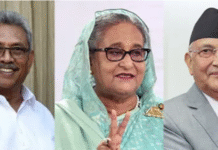
Bangladesh’s former prime minister and opposition leader, Khaleda Zia, at a protest rally, Dhaka, Bangladesh,
On April 5, following the injunction of a judge in Dhaka, Khaleda Zia, the former Bangladeshi prime minister and current leader of the opposition Bangladesh Nationalist Party (BNP), showed up in court accused of responsibility for a lethal arson attack last year. Prosecutors claimed that Zia instigated the attack on a bus, which left 12 people dead, by calling on her supporters to enforce a transportation blockade as part of protests against the government of the present prime minister, Sheikh Hasina, of the Awami League.
After her appearance in court, Zia almost immediately obtained bail. To no surprise, her party and her supporters have dismissed the charges, which are also aimed at 27 other BNP leaders, as frivolous and politically motivated.
The veracity of the charges aside, Zia’s willingness to surrender to the court was significant. Last year, another arrest warrant was issued for two graft cases, but it was not executed because Zia refused to show up. Even though Bangladesh has a working judiciary, its ability to always implement its writ is at question. Now that Zia is on bail, it remains to be seen how the judiciary will attempt to prosecute the case against her and the other opposition activists and followers.
On one level, her arrest and court date can be written off as just the latest episode in a long-standing and bitter political rivalry between Zia and Hasina, two headstrong leaders who have dominated Bangladeshi politics for the past decade and a half. There is no love lost between them. Apart from ideological differences between the Awami League, which is putatively secular, and the BNP, which has Islamist leanings, the two women have long been at odds. Yet it would be a mistake to assume that this incident is only another bout in their long, drawn-out fight.
Instead, a number of recent developments in Bangladesh cast a very different light on Zia’s arrest warrant, which signals a deeper crisis in the country’s democracy. Over the past year, two disturbing trends have characterized Bangladesh’s politics. The first has involved the growth of violent religious intolerance, manifest in horrific, fatal attacks on a number of secular bloggers. The most recent of these took place just last week: Nazimuddin Samad, a 28-year-old student at Jagannath University, was attacked with machetes and then shot dead on a Dhaka street, making him the sixth such victim of religious zealots in the past 14 months.
Despite this spate of violence targeting secular intellectuals and activists, Bangladesh’s government has evinced little interest in bringing the perpetrators to justice. Worse still, some Islamist groups, most notably the extremist Ansarullah Bangla Team, have even acknowledged their involvement in the killing of one of the bloggers, Avijit Roy, who was murdered last year when he and his wife were on their way home after attending a book fair in Dhaka. Bangladeshi authorities have yet to convict anyone of Roy’s murder, or of any of the other five murders.
Neither the Awami League nor the Bangladesh National Party has accepted the fundamental principle of a working democracy—the notion of a loyal opposition.
The other equally disturbing trend is the lurch toward authoritarianism under Hasina’s government. Its willingness to harass the principal opposition party, the BNP, is nothing new. However, not content with stalking the opposition, the government has now turned against other critics, shutting down a number of television shows that had criticized Hasina’s government in early 2015.
Even more disturbing is the government’s use of the courts to attack respected news organizations. The most dramatic such case involved 79 suits—17 for sedition and 62 for defamation—that were brought against Mahfuz Anam, a highly respected Dhaka-based editor and publisher of the prominent newspaper, The Daily Star. Anam fell afoul of the regime when, in early February, he publicly admitted to having run a 2007 editorial about corruption within Hasina’s Awami League, then in the opposition, based on false information supplied by Bangladesh’s intelligence agency and under pressure from the powerful Bangladeshi military.
Though Anam expressed regret over the editorial, calling it the “biggest mistake” of his professional life, Hasina and her son, Sajeeb Wajed Joy, have both accused him of having written it to deliberately tarnish her reputation. There is no evidence, however, that Anam and the newspaper, which has generally been sympathetic to the views of the Awami League, had knowingly and deliberately pursued such a course of action. Clearly Anam’s error, instead, was to make a public recantation of the contents of the editorial. In a rare bit of good news this week, Bangladesh’s High Court ordered a three-month freezeon a majority of the charges.
Unfortunately, Anam’s ordeal is not the only trouble confronting The Daily Star. The government has also sought to hound the newspaper by other means, including by reportedly pressuring both local and foreign companies to stop advertising in it.
These developments alone bode ill for the state of Bangladesh’s tenuous democracy, but there are more dangers. The government is now attempting to pass legislation that would criminalize any challenge to the official figure that 3 million people were killed in the Bangladesh genocide of 1971. Supporters of this proposed legislation argue that it is in keeping with the practice of some European countries that prohibit the questioning of the Holocaust.
But this argument seems disingenuous. Some right-wing Islamists have, in fact, tried to minimize the horrors that befell Bangladesh, then East Pakistan, at the hands of the Pakistani army. However, there is a legitimate debate among researchers about the actual number of those killed during the bloody war that Bengali nationalists fought against the Pakistani army that led to the creation of Bangladesh.
In all likelihood, the government’s underlying reason for pursuing the law is its desire to squelch any challenge to its own historical legacy as it tries to cement one-party rule. As David Bergman, a Bangladesh-based journalist, recently argued in The New York Times, the Awami League wants to promote the view that it alone was responsible for the liberation of East Pakistan.
After a long spell of military rule, Bangladesh made a rocky transition to democracy in 1991. Since then, power has alternated between the two major parties. Neither the Awami League nor the BNP, however, has accepted the fundamental principle of a working democracy—namely, the notion of a loyal opposition. This single failure has prevented the country from consolidating democracy. Given the inclinations of Hasina’s government toward its critics and increasingly toward Zia, other democratic norms, which were never especially robust in Bangladesh, are in serious danger of fraying even more.
Source:









